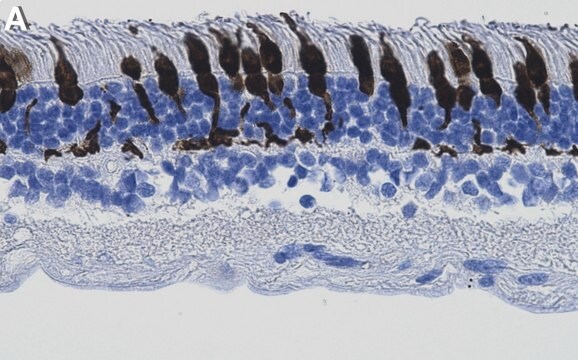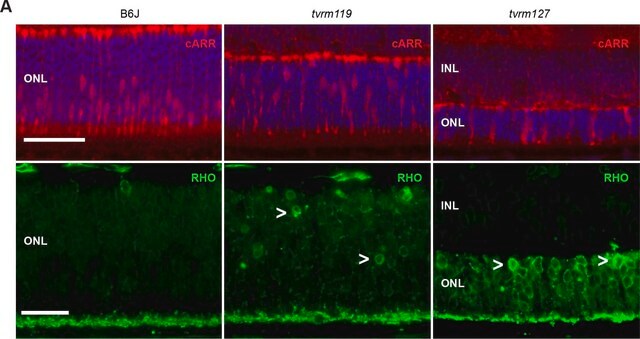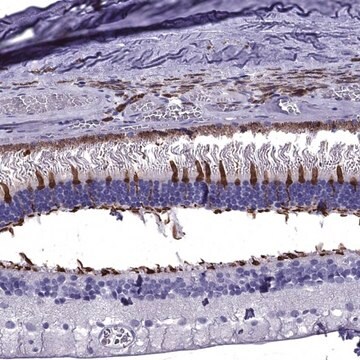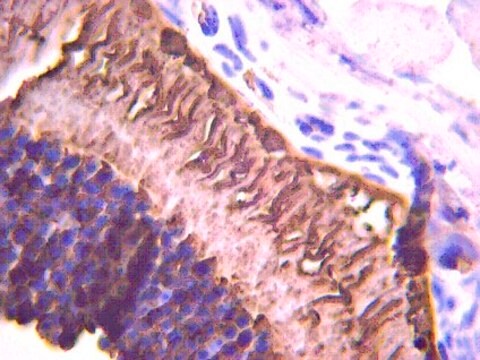推荐产品
生物源
mouse
品質等級
共軛
unconjugated
抗體表格
purified antibody
抗體產品種類
primary antibodies
無性繁殖
7G6, monoclonal
分子量
calculated mol wt 42.67 kDa
純化經由
using protein G
物種活性
human, monkey, bovine
包裝
antibody small pack of 100 μg
技術
immunofluorescence: suitable
immunohistochemistry (formalin-fixed, paraffin-embedded sections): suitable
western blot: suitable
同型
IgG1κ
表位序列
N-terminal
UniProt登錄號
運輸包裝
2-8°C
目標翻譯後修改
unmodified
基因資訊
mouse ... arr3> ARR3(102134564)
一般說明
Arrestin-C (UniProt: A0A2K5U9A7; also known as Cone arrestin, Retinal cone arrestin-3) is encoded by the ARR3 gene (Gene ID: 102134564) in Monkey. Arrestins are a superfamily of multi-functional proteins that that regulate signaling and trafficking of the majority of G-protein-coupled receptors (GPCRs), as well as sub-cellular localization and activity of many other signaling proteins. Arrestin-C is predominantly found in inner and outer segments, and the inner plexiform regions of the retina. It is expressed in cone photoreceptors and pinealocytes and may contribute to the shut-off mechanisms associated with high acuity color vision. Arrestin-C is an elongated two-domain molecule with overall fold and key inter-domain interactions that hold the free protein in the basal conformation similar to the other subtypes. Several structural elements are reported to contribute to arrestin binding. The C-terminal acidic region serves a regulatory role in controlling arrestin binding selectivity toward the phosphorylated and activated form of a receptor. The basic N-terminal domain directly participates in receptor interaction and serves a regulatory role via intramolecular interaction with the C-terminal acidic region. Also, two centrally localized domains are directly involved in determining receptor binding specificity and selectivity. Clone 7G6 is a cone-specific marker that recognizes all cones in the adult primate retina. In fetal retina, although long and middle wavelength-sensitive cones recognized by clone 7G6, a subset of short wavelength-sensitive cones are shown to be delayed in their reactivity to this clone. (Ref.: Zhang, H., et al. (2003). Invest. Opthalmol. Vis. Sci. 44(7); 2858-2867; Wikler, KC., et al. (1997). J. Comp. Neurol. 377(4); 500-508).
特異性
Clone 7G6 is a mouse monoclonal antibody that detects cone arrestin (Arrestin-C). It targets an epitope within the N-terminal region.
免疫原
Crude retinal extract from Monkey (Macaca fascicularis).
應用
Quality Control Testing
Isotype testing: Identity Confirmation by Isotyping Test.
Isotyping Analysis: The identity of this monoclonal antibody is confirmed by isotyping test to be mouse IgG1.
Tested Applications
Western Blotting Analysis: A representative lot detected Arrestin-C in Western Blotting applications (Zhang, H., et al. (2003). Invest Ophthalmol Vis Sci.;44(7):2858-67).
Immunohistochemistry Applications: A representative lot detected Arrestin-C in Immunohistochemistry applications (Wikler, K.C., et al. (1997). J Comp Neurol.;377(4):500-8; John, S.K., et al. (2000). Mol Vis.;6:204-15; Zhang, H., et al. (2003). Invest Ophthalmol Vis Sci.;44(7):2858-67; O′Brien, J.J., et al. (2012). J Neurosci.;32(13):4675-87).
Immunofluorescence Analysis: A 1:500 dilution from a representative lot detected Arrestin-C in frozen monkey retina tissues (Courtesy of Prof. Peter MacLeish, Ph.D., photo by Talib Saafir, Ph.D., Morehouse School of Medicine, Atlanta, GA, USA).
Immunofluorescence Analysis: A representative lot detected Arrestin-C in Immunofluorescence applications (Zhang, H., et al. (2003). Invest Ophthalmol Vis Sci.;44(7):2858-67).
Note: Actual optimal working dilutions must be determined by end user as specimens, and experimental conditions may vary with the end user
Isotype testing: Identity Confirmation by Isotyping Test.
Isotyping Analysis: The identity of this monoclonal antibody is confirmed by isotyping test to be mouse IgG1.
Tested Applications
Western Blotting Analysis: A representative lot detected Arrestin-C in Western Blotting applications (Zhang, H., et al. (2003). Invest Ophthalmol Vis Sci.;44(7):2858-67).
Immunohistochemistry Applications: A representative lot detected Arrestin-C in Immunohistochemistry applications (Wikler, K.C., et al. (1997). J Comp Neurol.;377(4):500-8; John, S.K., et al. (2000). Mol Vis.;6:204-15; Zhang, H., et al. (2003). Invest Ophthalmol Vis Sci.;44(7):2858-67; O′Brien, J.J., et al. (2012). J Neurosci.;32(13):4675-87).
Immunofluorescence Analysis: A 1:500 dilution from a representative lot detected Arrestin-C in frozen monkey retina tissues (Courtesy of Prof. Peter MacLeish, Ph.D., photo by Talib Saafir, Ph.D., Morehouse School of Medicine, Atlanta, GA, USA).
Immunofluorescence Analysis: A representative lot detected Arrestin-C in Immunofluorescence applications (Zhang, H., et al. (2003). Invest Ophthalmol Vis Sci.;44(7):2858-67).
Note: Actual optimal working dilutions must be determined by end user as specimens, and experimental conditions may vary with the end user
Anti-Arrestin-C, clone 7G6, Cat. No. MABN2636, is a mouse monoclonal antibody that detects Arrestin-C and is tested for use in Immunofluorescence, Immunohistochemistry, and Western Blotting.
外觀
Purified mouse monoclonal antibody IgG1 in buffer containing 0.1 M Tris-Glycine (pH 7.4), 150 mM NaCl with 0.05% sodium azide.
儲存和穩定性
Recommend storage at +2°C to +8°C. For long term storage antibodies can be kept at -20°C. Avoid repeated freeze-thaws.
其他說明
Concentration: Please refer to the Certificate of Analysis for the lot-specific concentration.
免責聲明
Unless otherwise stated in our catalog or other company documentation accompanying the product(s), our products are intended for research use only and are not to be used for any other purpose, which includes but is not limited to, unauthorized commercial uses, in vitro diagnostic uses, ex vivo or in vivo therapeutic uses or any type of consumption or application to humans or animals.
未找到合适的产品?
试试我们的产品选型工具.
儲存類別代碼
12 - Non Combustible Liquids
水污染物質分類(WGK)
WGK 1
閃點(°F)
Not applicable
閃點(°C)
Not applicable
我们的科学家团队拥有各种研究领域经验,包括生命科学、材料科学、化学合成、色谱、分析及许多其他领域.
联系技术服务部门







